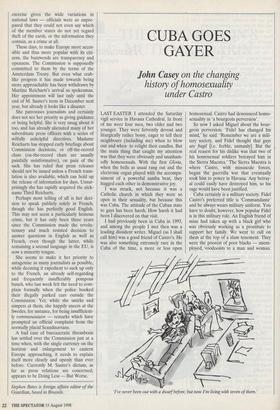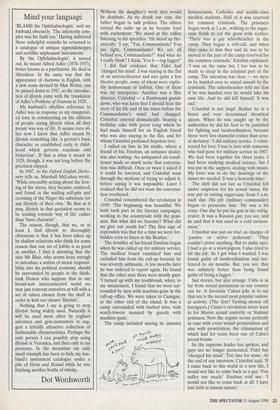CUBA GOES GAYER
John Casey on the changing history of homosexuality under Castro
LAST EASTER I attended the Saturday vigil service in Havana Cathedral. In front of me were four men, two older and two younger. They were fervently devout and liturgically rather bossy, eager to tell their neighbours (including me) when to blow out and when to relight their candles. But the main thing that caught my attention was that they were obviously and unasham- edly homosexuals. With the first Gloria, when the bells as usual rang out and the electronic organ played with the accompa- niment of a powerful samba beat, they hugged each other in demonstrative joy.
I was struck, not because it was a Catholic church in which they were so open in their sexuality, but because this was Cuba. The attitude of the Cuban state to gays has been harsh. How harsh it had been I discovered on that visit.
I had previously been in Cuba in 1993, and among the people I met then was a leading dissident writer. Miguel (as I shall call him) was a good friend of Castro's. He was also something extremely rare in the Cuba of the time, a more or less open homosexual. Castro had denounced homo- sexuality as 'a bourgeois perversion'.
So now I asked Miguel about the bour- geois perversion. 'Fidel has changed his mind,' he said. 'Remember we are a mili- tary society, and Fidel thought that gays are fragil [i.e. feeble, unmanly]. But the real reason for his dislike was that two of his homosexual soldiers betrayed him in the Sierra Maestra.' The Sierra Maestra is where Castro, with minuscule forces, began the guerrilla war that eventually took him to power in Havana. Any betray- al could easily have destroyed him, so his rage would have been justified.
Cuba certainly is a military society. Fidel Castro's preferred title is `Commandante' and he always wears military uniform. You have to doubt, however, how popular Fidel is in this military role. An English friend of mine had taken up with a black girl who was obviously working as a prostitute to support her family. We went to call on them at the top of a slum tenement. They were the poorest of poor blacks — unem- ployed, voodooists to a man and woman.
I've never been out with a dwarf before, but now I'm living with seven of them.' Without the daughter's work they would be destitute. As we drank our rum, the father began to talk politics. The others turned the radio up as he became loud with excitement: 'We stand at the rallies listening to his speeches.' He stood up the- atrically: 'I say, "Yes, Commandante! You are right, Commandante! We are all behind you, Commandante!" And what do I really think? I think: You f—ing faggot!'
I did find evidence that Fidel had `changed his mind'. I was staying in the flat of an actress/director and met quite a few theatre people, some of whom were explic- itly homosexual or lesbian. One of them was my interpreter. Another was a film director, Cristobal — a flamboyant grande dame, who was keen that I should hear the story of his life and of the times before the Commandante's mind had changed. Cristobal entered dramatically, bearing a birthday cake with green icing which he had made himself for an English friend who was also staying in the flat, and for whom Cristobal professed hopeless love.
I called on him in his studio, where a friend of his, Esteban, an antiques dealer, was also waiting. An antiquated air-condi- tioner made so much noise that conversa- tion was difficult. Once or twice I asked if it could be lowered, and Cristobal went through the motions of trying to adjust it, before saying it was impossible. Later I realised that he did not want the conversa- tion overheard.
Cristobal remembered the revolution in 1959: 'The beginning was beautiful. We both took part in the literacy campaigns, working in the countryside with the peas- ants. But what did we become? What did we give our youth for? The first sign of repression was that for a time we were for- bidden even to listen to the Beatles.'
The troubles of his friend Esteban began when he was called up for military service. The medical board examined him and excluded him from the call-up because he was severely asthmatic. A few months later he was ordered to report again. He found that the other men there were mostly gays: `I turned up with my toothbrush, when, to my amazement, I found that we were sur- rounded by men with machine-guns in the call-up office. We were taken to Camigue, at the other end of the island. It was a camp surrounded with barbed wire, with watch-towers manned by guards with machine-guns.'
The camp included among its inmates homosexuals, Catholics and middle-class medical students. Half of it was reserved for common criminals. The prisoners began work at 3 a.m., walking to the sugar- cane fields to cut the grass with scythes: `There was a gay schoolteacher in the camp. They began a roll-call, and when they came to him they said he was to be moved to the part of the camp reserved for the common criminals.' Esteban explained: `I was on the same list; I too was to be made to sleep in the criminal part of the camp. The intention was clear — we were to be handed over to sexual assault by the criminals. The schoolteacher told me that if he was handed over he would take his own life. And he did kill himself. It was sad.'
Cristobal is not fragil. Rather he is a brave and very determined theatrical queen. When he was caught up by the authorities he did his best to be punished for fighting and insubordination, because those were less shameful crimes than sexu- al deviancy: 'I did military service. I volun- teered for love. I was in love with someone who had gone for military service in 1967. We had been together for three years. I had been studying medical science, but I was put in the sappers, dealing with mines. My lover was to do the drawings of the mines we needed. It was a heavenly time.'
The idyll did not last as Cristobal fell under suspicion for his sexual tastes. He was put to cutting sugar-cane from 5 a.m. each day. His jefe (military commander) began to persecute him: 'He was a bit crazy. One day he put his gun in the refrig- erator. It was a Russian gun, you see, and he said that it was used to a cold environ- ment.'
Cristobal was put on trial on charges of `passive or active pederasty'. 'They couldn't prove anything. But to make sure, I had a go at a stool-pigeon. I also tried to hit the jefe. So I got what I wanted. I was found guilty of insubordination and sen- tenced to six months. But, you see, that was infinitely better than being found guilty of being a faggot.'
Sad stories, but also strange. Cuba is as far from sexual puritanism as any country can be. A favourite Cuban joke is to say that sex is the second most popular nation- al activity. (The first? Getting money off foreigners.) Castro's revolution never went in for Maoist sexual austerity or Stalinist primness. Now the regime seems perfectly at ease with every sexual permutation and also with prostitution, the elimination of which had for years been one of Cuba's proud boasts. • So the supreme leader has spoken, and gays are no longer persecuted. Fidel has `changed his mind'. Too late for some. At the end of our interview, Cristobal said, `If I came back to this world in a new life, I would not like to come back as a gay. You suffer too much.' Esteban told me: 'I would not like to come back at all. I have lost faith in human nature.'



























































 Previous page
Previous page